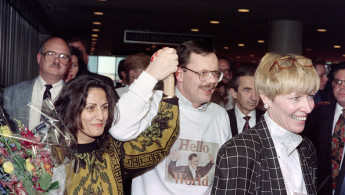US journalist Terry Anderson, once held captive in Lebanon, dies at 76
American journalist Terry Anderson, who was snatched by militants in Lebanon in 1985 during the country's multi-faceted civil war, and held hostage for six years, died at age 76 on Sunday, his former employer the Associated Press (AP) said.
Anderson, then the AP's Beirut bureau chief, was the longest-held Western hostage in Lebanon when he was finally released in 1991, after the war ended.
He died at his home in Greenwood Lake, New York, following complications from recent heart surgery, the agency reported, citing Anderson's daughter Sulome Anderson.
A former Marine, Anderson was chained and blindfolded during long stretches of his captivity, and became a symbol of the threat to foreign journalists and other Westerners amid turmoil in Lebanon.
His daughter was born shortly after his abduction, and due to his captivity, he did not meet her until she was 6 years old.
Press freedom groups, family members and relatives of more than a dozen other hostages pressed for their release for years.
Anderson later wrote a best-selling memoir, "Den of Lions," chronicling his ordeal at the hands of the pro-Iran Islamic Jihad group, which would later become Hezbollah.
Anderson, raised Roman Catholic, said his faith helped him survive the ordeal.
An Ohio native, Anderson served six years in the Marines, and saw combat in Vietnam before returning to the United States to study journalism.
The AP said he had worked for the agency in the United States and in Japan and South Africa before landing in Lebanon in 1982 to cover the Israeli invasion, staying on as the country slid into chaos.
Anderson had just finished playing tennis with a photographer colleague when abductors dragged him from his vehicle.
After his release by Islamic militants, Anderson returned to the United States to a vast public outpouring of relief at his freedom.
Anderson went on to teach at several universities before retiring nearly a decade ago.




 Follow the Middle East's top stories in English at The New Arab on Google News
Follow the Middle East's top stories in English at The New Arab on Google News


![A group of Palestinians, foreign and Israeli activists gather to participated in an olive picking event on the land in the town of Battir, which is under threat of confiscation by Israel in Bethlehem, occupied West Bank on 8 November 2024. [Getty]](/sites/default/files/styles/image_330x185/public/2182930803.jpeg?h=199d8c1f&itok=__0LgGsa)